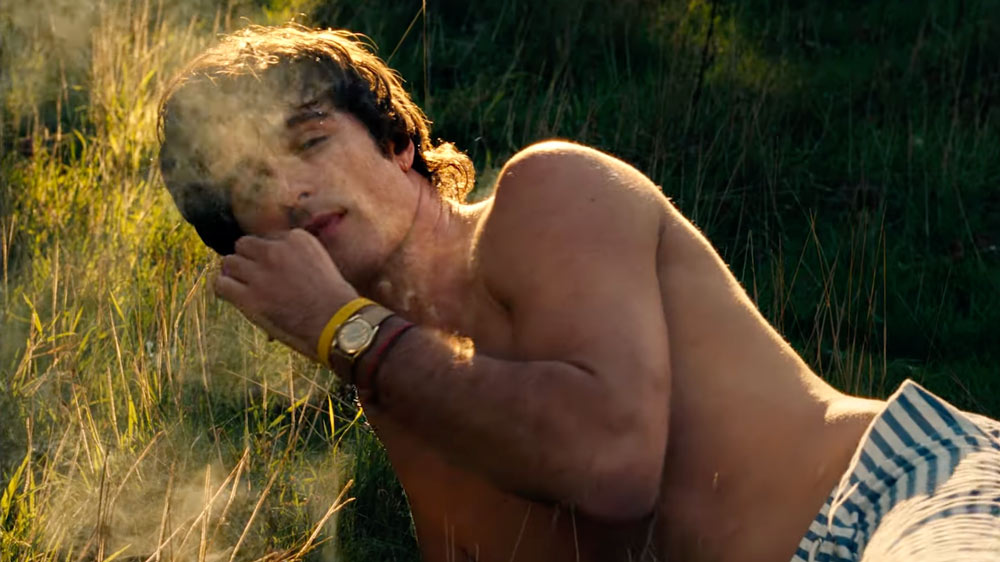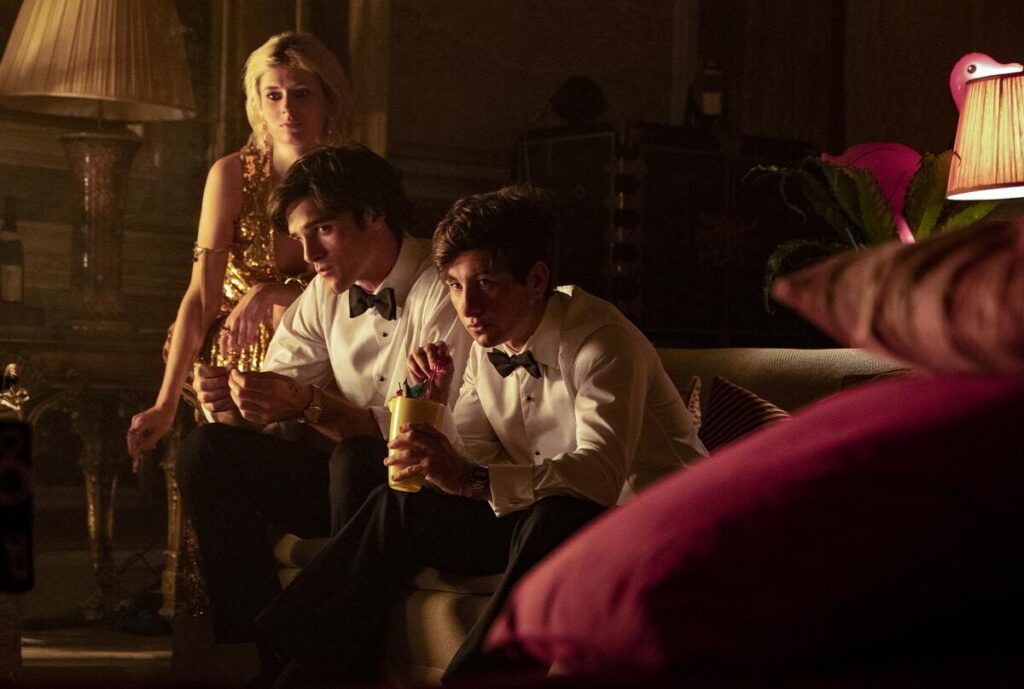Saltburn, a not exactly eat-the-rich skewering by way of Patricia Highsmith, is a glossy shockwave that finds Oscar-winning writer-director Emerald Fennell casting a seductive spell before twisting her sophomore picture into a somewhat reductive narrative knot. Despite a bigger budget and plenty of talent on the heels of her lacerating 2020 consent-revenge gut punch Promising Young Woman, Saltburn takes a bit of a dip, its solid production values and strong performances superseding its not quite as enlightening social commentary. What begins here as an engrossing psychological puzzle eventually gives way to an exercise in deliberately twisty storytelling.
A Lifestyles of the Rich and Famous redux injected with a dose of The Talented Mr. Ripley, Fennell has crafted a film that for a good while intrigues, pulling us into the mind of a shy, have-not Oxford freshman instantly intoxicated with his wealthy, charismatic classmate. So far, so good. But when Fennell moves away from this dynamic the film somewhat lessens its spirited intrigue.
In a terrific performance, Irish actor Barry Keoghan (The Banshees of Inisherin) stars as Oxford scholarship student and prototypical outsider Oliver Quick, who comes from a troubled family of no financial means but whose fortunes turn on a chance encounter with dashing Felix Catton (Jacob Elordi, star quality personified). Felix is everything Oliver is not—tall, handsome, monied, confident and warmly gregarious to boot. Fennell excels in mounting this youthful, euphoric pairing of fast friends.

This budding camaraderie presents a dream scenario for Oliver, a flight into the arms and graces of the proverbial big man on campus, suddenly wanted, needed and no longer socially outcast. While the pair drink, study, carouse and console each other, what exactly is in Oliver’s heart? In picture’s opening moments, he reflectively ponders their connection—was it love? If so, romantic love, brotherly love or undefined?
When summer break arrives Oliver has nowhere to return, so Felix invites him to the sprawling manor that is Saltburn, the Catton family’s countryside estate. At this point a narrative turns breaks the picture’s spell, the Oliver-Felix relationship ceding the story to accommodate a collection of new, sometimes less compelling characters.
At Saltburn the picture veers to class envy black comedy where we meet the lady of the house, status-conscious Elsbeth Catton (a welcomely dynamic Rosamund Pike), who takes a quick liking to Oliver; the lord of the manor, Sir James (Richard Grant), defined largely by eccentricity; bored, oversexed princess sister Venetia (Alison Oliver); gay visiting cousin Farleigh (Archie Madekwe), not fooled by Oliver’s status pursuits; and bohemian hanger on houseguest Pamela (Carey Mulligan, going for laughs).

The buddy-buddy story and Brideshead Revisited/A Handful of Dust culture clash plots eventually give way to something less novel, Fennell swerving into a variation on Pasolini’s 1968 Teorema, which found a seductive Terence Stamp insinuating his way into a bourgeois Italian family where he became, at once, all things to all people. In Saltburn, such a conquest strains credulity. Instead of making Oliver more intriguing, given everything we know about the character and have seen in Keoghan’s invested performance such maneuvers seem patently implausible, rendering the character a cipher, less enigmatic as the film progresses despite Keoghan’s fearless commitment to hinting at the recesses of Oliver’s mysterious psyche. This shell game is clearly part and parcel of Fennell’s subversive plot strategy, but it can diminish audience empathy.
To say more about Saltburn would be to spoil Fennell’s rug pulling second half, but the picture becomes perhaps too ambitious as it progresses, trading in the intrigue of Oliver-Felix relationship for a series of sexual assignations and lurid twists calculated to surprise, which seems the point. One can feel Fennell pulling the strings, sitting at her MacBook Pro and dreaming up ways to further bombshell the audience, throwing caution to the wind in favor of shocks (she gets them). How else to explain such outrageous moments as when a character licks a bathtub drain after secretly spying on another that has masturbated into the soapy water? And another designed to guarantee you may never visit a cemetery again without instant recall?
Whatever one makes of Saltburn’s twisty story, its tech credits and performances are top notch. Keoghan, Oscar-nominated earlier this year, registers fierce commitment and in the film’s final moments demonstrates there is nothing—nothing—that he is afraid to do onscreen, dancing naked in an extended, single-take tracking shot. During this sequence we less consider the character’s apparent liberation as much as the director-actor negotiation required to pull off such a brazen button pusher. The actor, with asymmetrical features including his famously bee-stung nose and often squinting eyes, conveys an oddly carnal energy subverted by sweet endearment; an enigma you can’t help liking even when you know he is up to no good. And the preternaturally beautiful Elordi is mesmeric, a lit fuse of sensual magnetism for Oliver and everyone in his wake. Pike, the venerable star of Gone Girl and a long run of other memorable performances, is comically unpredictable and almost sympathetic, lifting the picture each time she enters a scene.

Cinematographer Linus Sandgren delivers a finely mounted, decadent looking world of sex and mystery, from the castle’s upscale elegant sheen to its surrounding grounds, where tall grass barely obscures youthful nude frolicking, to one of those elaborate movie hedge mazes with seemingly no worldly exit, and where darkly sinister motivations and revelations remain hidden.
Loaded with depravity, thirst, envy, sexual gamesmanship and secrets, Saltburn believes it has something to say about class and power informed by a bit of Tom Ripley-esque psychosis. Given recent upper echelon dissections including Ruben Östlund’s Cannes-winning Triangle of Sadness and HBO’s The White Lotus, Fennell brings less to this milieu. Judging from the festival audience reaction during my screening, many may well revel in Fennell’s puppeteering and find the film an entertaining ride. For the rest of us, Saltburn will be a contrived provocation, perhaps both over and underwritten, in pursuit of thrills more than enlightenment.
2 1/2 stars



